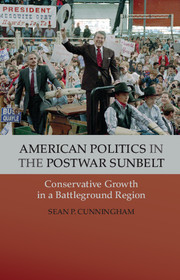Book contents
- Frontmatter
- Dedication
- Contents
- Acknowledgments
- Introduction
- 1 Convergence, Metropolitanization, and Anticommunism
- 2 Race, Rights, and the Liberal Consensus
- 3 Wars against Liberalism
- 4 Southern, Suburban, and Sunbelt Strategies
- 5 Mobilizing the Religious Right in the Politicized “Bible Belt”
- 6 Reagan’s Sunbelt, Reagan’s America
- 7 Shades of Red, Shades of Blue
- Epilogue
- Index
- References
4 - Southern, Suburban, and Sunbelt Strategies
Published online by Cambridge University Press: 05 July 2014
- Frontmatter
- Dedication
- Contents
- Acknowledgments
- Introduction
- 1 Convergence, Metropolitanization, and Anticommunism
- 2 Race, Rights, and the Liberal Consensus
- 3 Wars against Liberalism
- 4 Southern, Suburban, and Sunbelt Strategies
- 5 Mobilizing the Religious Right in the Politicized “Bible Belt”
- 6 Reagan’s Sunbelt, Reagan’s America
- 7 Shades of Red, Shades of Blue
- Epilogue
- Index
- References
Summary
On January 30, 1968, a combined force of North Vietnamese and Viet Cong insurgents caught American troops in South Vietnam by surprise when they launched a massive and coordinated assault that became known as the Tet Offensive. Over the next several weeks, American forces rallied to repel the offensive and win a decisive military victory. That victory notwithstanding, the Tet Offensive was a fatal political defeat for Lyndon Johnson, whose administration had been promising for months that its communist opponents in Southeast Asia were crumbling and that the war in Vietnam would soon be won. The newly presented evidence of Tet suggesting otherwise, the Democratic Party’s already fading political consensus quickly evaporated.
These divisions became clearer on March 12 when Senator Eugene McCarthy of Minnesota, an antiwar candidate, came stunningly close to defeating Johnson in the Democratic Party’s New Hampshire primary. Four days later, Robert F. Kennedy – Johnson’s most hated and feared political foe – announced his candidacy for the Democratic Party’s presidential nomination. Unwilling to face the possible humiliation of failing to win renomination, Johnson shocked the country two weeks later when he announced that he would not seek a second term as president. Then, on April 4 – just four days after Johnson’s announcement – Martin Luther King Jr. was assassinated in Memphis, Tennessee, while visiting that city in support of striking sanitation workers. Race riots subsequently erupted in several cities, including Washington, D.C.; Chicago; and Kansas City. Kennedy almost single-handedly helped mitigate the eruption of further riots as a result of an impromptu speech given in Indianapolis on the night of King’s death. Over the next two months, RFK – essentially seizing a mythical torch surrendered by his assassinated brother five years earlier – emerged as the candidate of choice for many of the nation’s most impoverished and politically disaffected citizens, especially recently enfranchised minorities. For many on the Left, Kennedy was their greatest hope for a truly progressive shift in national politics.
- Type
- Chapter
- Information
- American Politics in the Postwar SunbeltConservative Growth in a Battleground Region, pp. 126 - 159Publisher: Cambridge University PressPrint publication year: 2014



